In today’s fast-paced world, stress has become a common part of life. According to the American Psychological Association, chronic stress is linked to numerous health issues, including accelerated aging. While we cannot completely eliminate stress from our lives, understanding its impact on aging and learning how to manage it can significantly improve our overall well-being. This blog will explore the relationship between stress and aging, offering practical mental health tips to help manage stress and promote healthy aging.
Understanding the Relationship Between Stress and Aging
Biological Impact of Stress on Aging
Stress affects the body at a cellular level, accelerating the aging process. One of the primary ways stress impacts aging is through telomere shortening. Telomeres are protective caps at the ends of our chromosomes that naturally shorten as we age. Chronic stress accelerates this shortening, leading to premature aging and increased susceptibility to age-related diseases. Additionally, stress increases oxidative stress in the body, leading to cellular damage and inflammation, both of which contribute to aging.
Physical Manifestations
The physical signs of aging can be exacerbated by stress. Chronic stress can lead to the development of wrinkles, hair loss, and decreased skin elasticity. This happens because stress hormones, such as cortisol, break down collagen and elastin, the proteins responsible for keeping our skin firm and youthful. Furthermore, stress can cause sleep disturbances, poor nutrition, and lack of exercise, all of which negatively impact the skin and overall appearance.
Mental Health and Cognitive Decline
Prolonged stress doesn’t just affect our physical health; it also takes a toll on our mental well-being. Chronic stress is associated with increased risks of mental health issues such as depression and anxiety. It can also lead to cognitive decline, affecting memory, attention, and decision-making abilities. The cumulative effect of these mental health challenges can further contribute to the aging process, making it essential to address stress for both mental and physical health.

The Role of Cortisol in Aging
Cortisol and the Stress Response
Cortisol, often referred to as the stress hormone, plays a crucial role in the body’s response to stress. It helps regulate various bodily functions, including metabolism, immune response, and inflammation. However, chronic stress leads to prolonged elevated levels of cortisol, which can have detrimental effects on the body.
Effects of Elevated Cortisol Levels
When cortisol levels remain high over long periods, it can lead to several adverse effects that accelerate aging:
- Weight Gain: High cortisol levels are linked to increased appetite and cravings for high-calorie foods, leading to weight gain, particularly around the abdomen.
- Muscle Loss: Cortisol can break down muscle tissue, leading to loss of muscle mass and strength.
- Weakened Immune System: Chronic stress impairs the immune system, making the body more susceptible to infections and illnesses.
Reducing Cortisol Levels
Managing cortisol levels is crucial for healthy aging. Here are some strategies to help reduce cortisol levels:
- Regular Physical Activity: Exercise helps lower cortisol levels and promotes the release of endorphins, which improve mood and reduce stress.
- Adequate Sleep: Ensuring sufficient sleep each night helps regulate cortisol levels and improves overall health.
- Mindfulness Practices: Techniques such as meditation, yoga, and deep breathing can help reduce stress and lower cortisol levels.
Mental Health Tips to Manage Stress and Promote Healthy Aging
Mindfulness and Meditation
Mindfulness and meditation practices have been shown to reduce stress and improve mental clarity. By focusing on the present moment and practicing mindfulness, individuals can reduce anxiety and improve their emotional well-being. Regular meditation can lower cortisol levels, enhance brain function, and promote a sense of calm and relaxation.
Exercise and Physical Activity
Regular physical activity is one of the most effective ways to manage stress and promote healthy aging. Exercise releases endorphins, the body’s natural stress relievers, and helps improve mood. Engaging in a mix of cardiovascular exercise, strength training, and flexibility exercises can provide comprehensive health benefits, including reducing the risk of chronic diseases and improving cognitive function.
Healthy Eating
A balanced diet rich in antioxidants, vitamins, and minerals can help combat the effects of stress on the body. Foods such as fruits, vegetables, whole grains, and lean proteins provide essential nutrients that support overall health and well-being. Omega-3 fatty acids, found in fish and flaxseed, have been shown to reduce inflammation and improve brain health, making them particularly beneficial for managing stress and promoting healthy aging.
Sleep Hygiene
Quality sleep is crucial for managing stress and promoting healthy aging. Poor sleep can exacerbate stress and accelerate the aging process. Establishing good sleep hygiene practices, such as maintaining a consistent sleep schedule, creating a relaxing bedtime routine, and ensuring a comfortable sleep environment, can significantly improve sleep quality and overall health.
Social Connections and Support
Strong social connections and support networks play a vital role in managing stress and promoting mental health. Engaging in social activities, maintaining close relationships, and seeking support from friends, family, or support groups can help reduce feelings of isolation and improve emotional well-being. Positive social interactions can also lower cortisol levels and promote a sense of belonging and happiness.
In the next sections, we will delve into the influence of stress on the decision to undergo plastic surgery and develop a holistic approach to stress management and aging. Stay tuned for more insights on how to effectively manage stress and promote healthy aging.
Plastic Surgery and Stress
The Decision to Undergo Plastic Surgery
Stress and its impact on self-perception can significantly influence the decision to undergo plastic surgery. For many individuals, stress exacerbates concerns about physical appearance, leading to a heightened desire for aesthetic improvements. The pressure to maintain a youthful appearance can be intense, especially in cultures that place a high value on physical beauty. This stress can drive individuals to consider plastic surgery as a solution to their aging concerns.
Psychological Considerations
The potential mental health benefits and risks associated with plastic surgery are important to consider:
- Benefits: For some, plastic surgery can boost self-esteem and confidence, reducing the stress associated with aging and appearance. It can provide a sense of control and satisfaction with one’s looks.
- Risks: However, there are also psychological risks. Unrealistic expectations and the pressure to achieve perfection can lead to disappointment and further stress. Additionally, the decision to undergo surgery should be carefully considered, ensuring that it is not solely driven by stress and external pressures but by a genuine desire for self-improvement.
Informed Decisions
Making informed decisions about plastic surgery is crucial. It’s essential to:
- Consult Professionals: Seek advice from qualified plastic surgeons and mental health professionals to understand the potential outcomes and risks.
- Evaluate Motivation: Reflect on the reasons behind the desire for surgery. Ensure that the decision is based on personal goals and not solely on stress or societal pressure.
- Consider Alternatives: Explore non-surgical options and holistic approaches to managing aging and stress before deciding on surgery.
Developing a Holistic Approach to Stress Management and Aging
Combining Strategies
A comprehensive approach that combines mental health practices, lifestyle changes, and, if appropriate, medical interventions can effectively manage stress and promote healthy aging. This integrated strategy ensures that all aspects of well-being are addressed.
Regular Check-Ups
Regular medical and psychological check-ups are vital for monitoring health and stress levels. These check-ups help identify any potential issues early on and provide opportunities to adjust strategies for better management of stress and aging.
Personalized Plan
Creating a personalized stress management plan tailored to individual needs is crucial. This plan can include:
- Mental Health Practices: Incorporate mindfulness, meditation, and relaxation techniques into daily routines.
- Physical Activity: Engage in regular exercise that suits individual preferences and fitness levels.
- Healthy Eating: Follow a balanced diet rich in nutrients that support overall health and combat the effects of stress.
- Social Support: Maintain strong social connections and seek support from friends, family, or support groups.
- Professional Guidance: Work with healthcare providers to develop and adjust the plan as needed, ensuring it remains effective and relevant.
Conclusion
Stress significantly impacts the aging process, affecting both physical and mental health. By understanding the relationship between stress and aging, individuals can take proactive steps to manage stress and promote healthy aging. Key takeaways include:
- Chronic Stress and Aging: Stress accelerates aging at a cellular level, leading to visible signs of aging and cognitive decline.
- Cortisol’s Role: Elevated cortisol levels contribute to weight gain, muscle loss, and weakened immunity, exacerbating aging.
- Mental Health Tips: Mindfulness, exercise, healthy eating, sleep hygiene, and social connections are effective strategies for managing stress.
- Plastic Surgery Considerations: Stress influences the decision to undergo plastic surgery, but it’s important to make informed, well-considered choices.
MindOwl Founder – My own struggles in life have led me to this path of understanding the human condition. I graduated with a bachelor’s degree in philosophy before completing a master’s degree in psychology at Regent’s University London. I then completed a postgraduate diploma in philosophical counselling before being trained in ACT (Acceptance and commitment therapy).
I’ve spent the last eight years studying the encounter of meditative practices with modern psychology.

